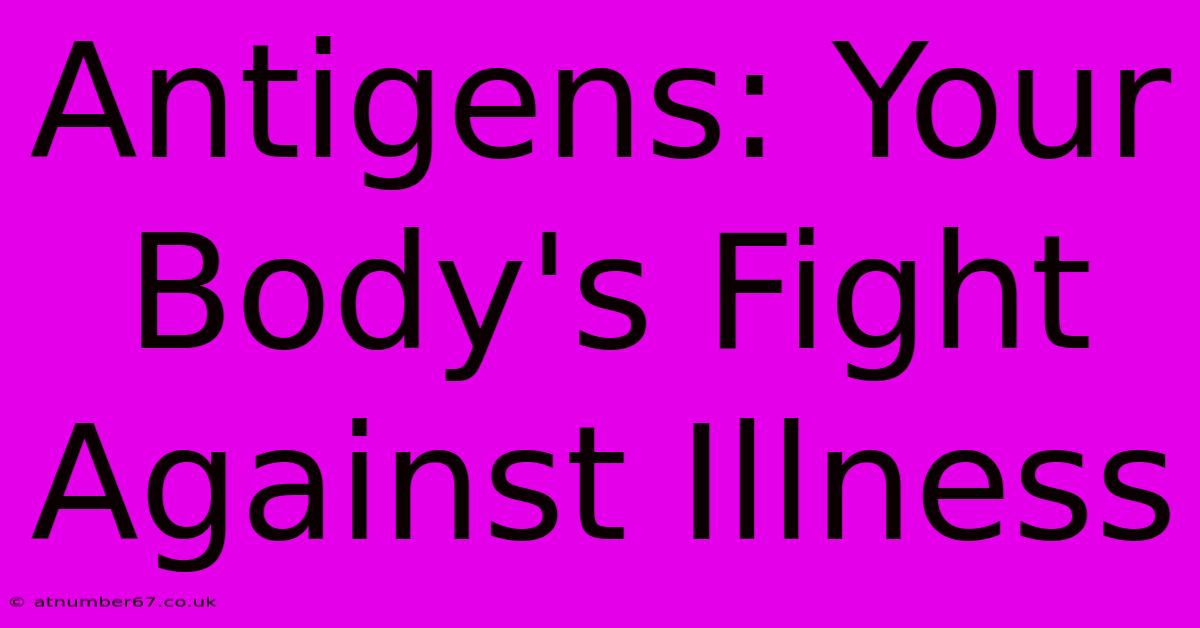Antigens: Your Body's Fight Against Illness

Table of Contents
Antigens: Your Body's Fight Against Illness
Our bodies are constantly under siege. From the air we breathe to the food we eat, we're exposed to a vast array of potentially harmful substances. Our immune system, a complex network of cells and processes, acts as our defense force, identifying and neutralizing these threats. Central to this defense are antigens. Understanding antigens is key to understanding how our bodies fight illness.
What are Antigens?
Simply put, an antigen is any substance that can trigger an immune response. These substances are often foreign invaders like:
- Bacteria: These single-celled organisms cause a wide range of infections.
- Viruses: These microscopic parasites require a host cell to reproduce and can cause illnesses like the flu and COVID-19.
- Fungi: These organisms, ranging from yeasts to molds, can cause infections in various parts of the body.
- Parasites: These organisms, such as protozoa and worms, can live within or on a host, causing disease.
- Toxins: Poisonous substances produced by bacteria, fungi, or other organisms.
- Pollen: While not inherently harmful to everyone, pollen can trigger allergic reactions in sensitive individuals.
However, antigens aren't always foreign invaders. Sometimes, the body mistakenly identifies its own cells or molecules as foreign, leading to autoimmune diseases. These conditions occur when the immune system attacks healthy tissue, causing inflammation and damage. Examples include rheumatoid arthritis, lupus, and type 1 diabetes.
How Antigens Trigger an Immune Response
When an antigen enters the body, it's recognized by specialized immune cells, primarily lymphocytes. These cells have receptors that bind to specific antigens. This binding acts as a signal, initiating a cascade of events:
- Antigen Presentation: Immune cells, such as dendritic cells and macrophages, engulf and process the antigen, presenting fragments on their surface to T cells.
- T Cell Activation: T cells, a type of lymphocyte, recognize the antigen presented by these cells. This recognition activates the T cells, initiating an immune response.
- B Cell Activation: B cells, another type of lymphocyte, also recognize the antigen. Activated B cells produce antibodies, specialized proteins that bind to the antigen, neutralizing it and marking it for destruction.
- Immune Response: This involves a variety of cells and processes working together to eliminate the antigen, including the activation of cytotoxic T cells that directly kill infected cells, and the recruitment of other immune cells to the site of infection.
The Importance of Antigen Recognition in Immunity
The ability of the immune system to recognize and respond to specific antigens is crucial for protecting us from disease. This specificity is what allows vaccines to be effective. Vaccines introduce a weakened or inactive form of an antigen, triggering an immune response without causing illness. This response creates immunological memory, allowing the body to mount a faster and stronger response if it encounters the real antigen in the future.
Antigen Testing: Diagnosing Illness
Antigen testing is a common diagnostic tool used to detect the presence of specific antigens in the body. Rapid antigen tests for illnesses like influenza and COVID-19 are widely used because they provide quick results. These tests identify antigens associated with the specific pathogen, indicating a current infection.
Conclusion: A Constant Battle
Antigens are a fundamental part of our immune system's defense mechanism. Understanding how our bodies recognize and respond to these substances is vital for comprehending the complexities of the immune system and developing effective strategies for preventing and treating infectious diseases and autoimmune disorders. The constant battle between our bodies and antigens shapes our health and well-being, highlighting the critical role of a functioning immune system.

Thank you for visiting our website wich cover about Antigens: Your Body's Fight Against Illness. We hope the information provided has been useful to you. Feel free to contact us if you have any questions or need further assistance. See you next time and dont miss to bookmark.
Featured Posts
-
Pote Age Hydration For Health And Beauty
Apr 05, 2025
-
Janine Gutierrez Her Age And Her Ongoing Journey
Apr 05, 2025
-
Alan Sugars Net Worth A Look At His Career
Apr 05, 2025
-
Arjun Kapoors Net Worth The Truth Is Out There
Apr 05, 2025
-
Ms Dhonis Net Worth Surprisingly High
Apr 05, 2025
